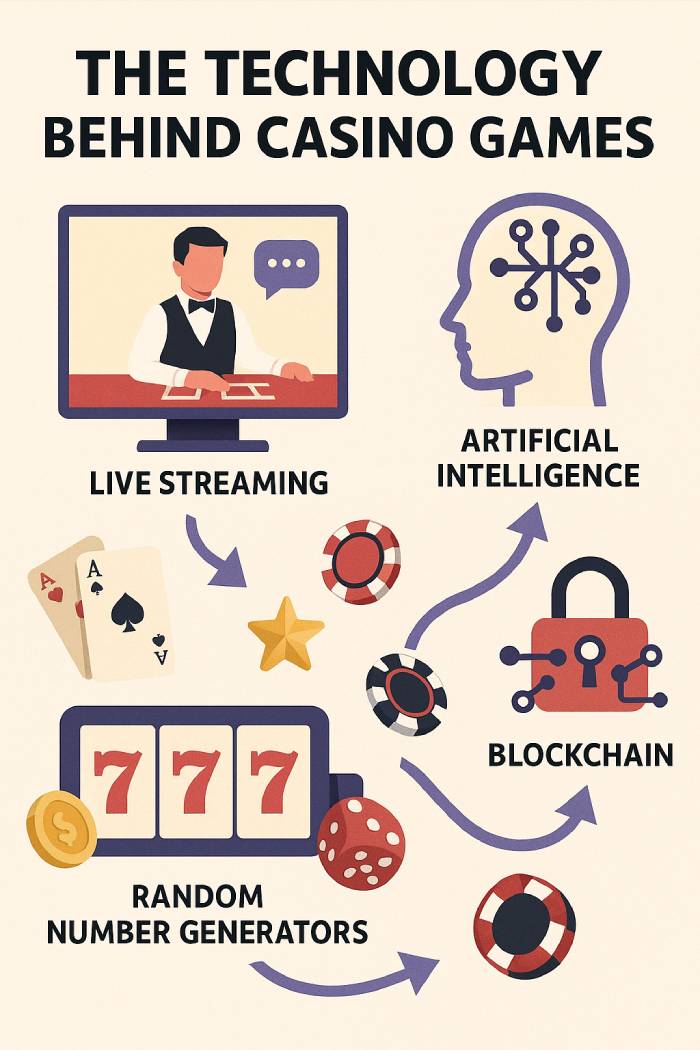From AI to Blockchain: The Future of Casino Games

The online casino industry has been growing at lightning speed, becoming more than just entertainment—it’s now a major part of the global digital entertainment market. Since the COVID-19 pandemic, demand for online casinos that can be enjoyed from home has skyrocketed. What started with simple digital slot machines has now evolved into live casino games that recreate the thrill of being in a real casino.
Today, players can connect with real dealers through live video, place bets, and watch results unfold instantly. This is made possible thanks to advanced technologies: high-definition video streaming, artificial intelligence (AI), blockchain verification, and more. Together, they create a fair and immersive casino experience. Major platforms such as Evolution Gaming and Playtech have pioneered these innovations, while brands like Betway and 888 Casino showcase them to millions of players worldwide.
How Live Casino Games Work
Live casino games are run from dedicated studios. Professional dealers shuffle cards, spin roulette wheels, and roll dice in real time, while multiple cameras capture every moment. Ultra-low latency streaming delivers the action straight to players’ screens, making it feel like they’re right there at the table.
Players aren’t just passive viewers. They can chat with dealers, interact with other players, and switch between multiple camera angles for added trust and engagement. This setup successfully brings the atmosphere of offline casinos into the digital space. In fact, it’s now common to see casino dealers working in front of cameras even inside large land-based casinos.
The Technology Behind It
Several core technologies power live casino experiences:
- HD/4K Streaming: Ensures smooth, crystal-clear video with minimal delay. Every shuffle, spin, or roll is shown in detail.
- OCR (Optical Character Recognition): Converts real-time gameplay (like flipped cards or roulette outcomes) into digital data, ensuring the on-screen results match reality.
- GCU (Game Control Unit): A small device at each table that compresses and transmits video without errors.
- RNG (Random Number Generator): Used for slots and some digital games, ensuring results are completely random. Blockchain verification can add extra transparency.
- User Interface (UI): Allows players to place bets, chat, and check game history. A clean, responsive design keeps players engaged.
With the rise of 5G and cloud technology, mobile optimization has become a priority. Today, players can enjoy smooth live games directly from their smartphones, expanding the reach of the industry. Companies like LeoVegas and PokerStars have invested heavily in mobile-first platforms to capture this trend.

Market Growth and Key Numbers
The business side of online casinos is booming in 2025:
- The global online gambling market is valued at about USD 117.5 billion in 2025, and analysts expect it to reach USD 186.6 billion by 2029, growing at roughly 12.3% annually.
- The online casino segment alone is worth around USD 37.7 billion in 2025, with projections to exceed USD 113 billion by 2033.
- In the U.S., regulated online casino states are generating billions: Pennsylvania leads with USD 3.17 billion in annual gross gaming revenue (GGR), followed by Michigan (USD 2.81 billion) and New Jersey (USD 2.69 billion).
- Crypto casinos are expanding rapidly, reporting USD 81.4 billion in revenue in 2024, over five times more than in 2022.
- In Europe, the U.K. online gambling market alone was worth around USD 15.1 billion in 2024, while markets in Germany and Italy continue to grow steadily thanks to regulatory reforms.
- In Asia-Pacific, countries like the Philippines and Macau are driving growth in online and hybrid casino models, and analysts expect the region to surpass USD 45 billion by 2027.
Industry experts echo these figures. According to Dr. Laura McKenzie, a digital gaming analyst at TechMarket Insights, “The acceleration we see in Europe and Asia is reshaping the entire industry. It’s no longer a Western-centric market; Asia-Pacific will likely drive the next wave of innovation and adoption.” Meanwhile, casino consultant James O’Reilly notes, “Players are demanding fairness and transparency more than ever. Blockchain and AI are not just marketing buzzwords—they are essential for building trust in a competitive market.”
Connection With Online Slots
Slots remain the most popular online casino games. Simple gameplay, flashy graphics, and quick rounds make them a go-to choice for beginners. But slot sites are also adopting live casino tech to enhance the experience.
For example, AI can personalize slot recommendations, while blockchain ensures results can’t be tampered with. Some developers are even creating VR slots, where players pull levers in a virtual casino floor, blending slots and live play into one ecosystem. NetEnt and Microgaming have already launched next-generation slot titles that merge classic gameplay with cutting-edge tech.
Future Technologies Shaping the Industry
The next wave of casino innovation is expected to come from three main areas:
- AI & Machine Learning: Personalizing bonuses, predicting preferences, detecting fraud, and even replacing customer support with chatbots.
- VR & AR: Virtual reality (VR) makes players feel like they’re inside a real casino lounge, while augmented reality (AR) overlays game visuals on the real world.
- Blockchain: Secures game outcomes and transactions by recording them on public ledgers. It also enables safe, instant global payments through crypto wallets.
Benefits for Casino Operators
For operators, live casino technology isn’t just about player experience—it’s a business game-changer:
- Lower Costs: Unlike physical casinos, online operations require less investment and upkeep.
- Global Reach: Multilingual support and cross-platform access allow operators to target players worldwide.
- Data Insights: Real-time player behavior analysis helps fine-tune marketing and engagement strategies.
This is why both startups and established casino brands are racing into the online live casino market, driving fierce competition and innovation. For instance, DraftKings in the U.S. and Entain in Europe are expanding aggressively into live casino services.
The Road Ahead
The online casino market is projected to reach nearly USD 74.4 billion by 2032. Live casino games, in particular, are expected to lead the charge, keeping players engaged and loyal. Key factors will be mobile-first design, low-latency streaming, and seamless crypto payments.
In the end, the future of casinos isn’t just about offering games—it’s about building trust, immersion, and personalization through technology. As gaming researcher Ana López puts it, “The platforms that can deliver realism, fairness, and convenience at the same time will define the next decade of online entertainment.”
Risks and Challenges Ahead
While opportunities are vast, experts warn of challenges that must be addressed. Regulatory frameworks differ widely across regions, creating uncertainty for operators seeking global reach. Governments in Europe are tightening advertising restrictions, while Asia-Pacific markets still face unclear licensing rules. At the same time, concerns about gambling addiction and responsible gaming are growing. Operators will need to balance innovation with social responsibility, ensuring tools for self-exclusion, spending limits, and transparent communication are in place. These risks mean the industry’s future will depend not only on technology, but also on how responsibly it is implemented.

